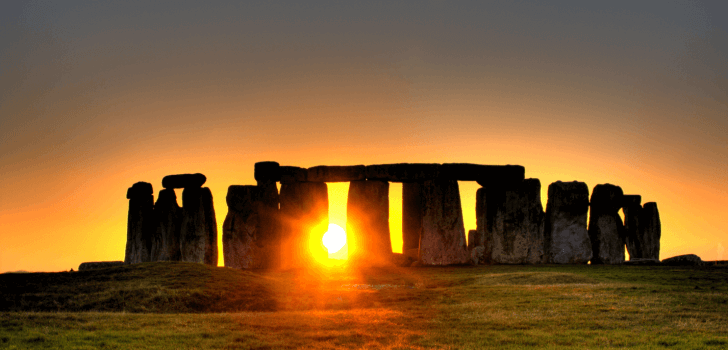Stonehenge will experience a major change in the near future, as officials are planning to construct a tunnel to replace the current road to the historic monument. But while officials have been surveying the site for the tunnel project, they have uncovered more mysteries about the ancient landmark. They have also attracted the displeasure from opposition groups who want Stonehenge to be left alone.
One such discovery made by surveyors is a gorgeous pit that was cut roughly one meter deep into the chalk. The creators of the pit used no tools other than simple picks that were crafted out of red deer antlers. Although the tools were primitive, the work was completed in expert fashion. The bottom of the pit was leveled so nearly that it could balance a glass of water without spilling a single drop.
The newly discovered pit was originally created for the purpose of supporting a large wooden post. From there, a well-designed trench connects to a second pit that is equally as well-crafted as the first. From the rolling chalk down the land, these posts would have been visible for miles on end. The line of the trench seems to lead towards a neighboring field of Waitrose pigs.
However, experts aren’t exactly sure what these posts were intended to represent. For now, archaeologists believe that it could have been anything from a gateway to a boundary marker. Currently, archaeologists are waiting for a lab report to be completed so that they can determine the approximate date that this structure was created.
Surveying the land for the tunnel at Stonehenge has been no ordinary task. The surveying has included aerial photography, ground penetrating radar and the studying of maps that are centuries old. But perhaps most exciting is that the planning has uncovered many ancient monuments that historians knew nothing about.
Some of these recent discoveries include two previously unknown burial locations, which might date back to the iron ages, and a square enclosure that has researchers puzzled about its date of origin. Additionally, the surveying has managed to debunk some of the previous suspicions of historians. For instance, one suspected burial ground actually turned out to be a medieval dew pond. Other research has shown just how intensely this land was farmed for thousands of years.
Still, the main goal is solving the road problem. The closing of some of the roads in the area has caused traffic on other roads to become unbearably congested. The new tunnel project should make things much more pleasant for visitors to the world heritage site (WHS). Chief executive of Historic England Duncan Wilson believes that the road issue will soon be solved.
Wilson said, “I know my predecessors have said this before, but I do believe this time it is going to happen. It may be a bit of a cliché, but I really do believe we now have a once in a generation chance to reunite the landscape setting of one of the world’s most famous ancient monuments. The re-sited visitor center has already made a major contribution, but the road was the great outstanding problem. There are still many questions to resolve about the details of the tunnel and where the portals should be sited, but I think the advantages of a tunnel of at least 2.9km, which is what the government is proposing, far outweighs the disadvantages.”
But while the tunnel project is still moving ahead, it’s very difficult to propose any new construction at Stonehenge without experiencing a major conflict from people who want the area left alone. Every move that is made by surveyors and construction workers is closely watched by the Stonehenge Alliance, a group dedicated to protecting the area from further destruction.
While the Stonehenge Alliance acknowledges that there is definitely a traffic congestion issue, the group would prefer to leave the current road as it is now and instead construct a tunnel outside of Stonehenge grounds. However, such a tunnel outside the area would be more costly and much harder to construct. Still, this hasn’t stopped the Stonehenge Alliance from obtaining nearly 20,000 signatures for a petition that demands that the site be left alone.
Member of the Stonehenge Alliance Kate Fielden said, “It is extraordinary that archaeological evaluation trenching should be taking place within the WHS before any final decision on tunnel length, engineering feasibility and costing have been investigated. Our bottom line is that there should be no further damage to the WHS.”
So while the tunneling project is moving ahead, groups like the Stonehenge Alliance will continue to protest the plan. Time will tell if the result of the tunnel is able to please both parties, who ultimately have the same goal of making the Stonehenge experience a better one. Surely the tunnel would be constructed in a way that doesn’t ruin the integrity of the ancient landmark. In the end, however the tunnel ends up, it should improve Stonehenge for the better.
Stay Connected